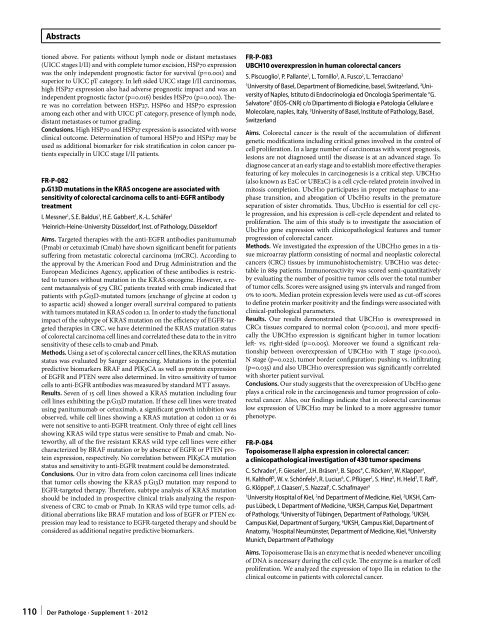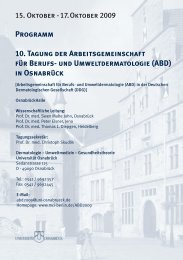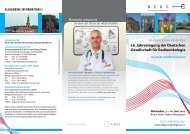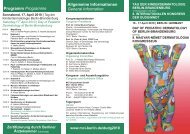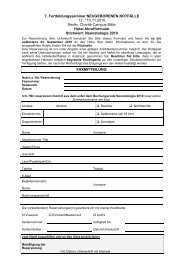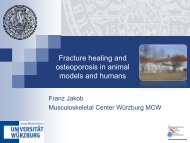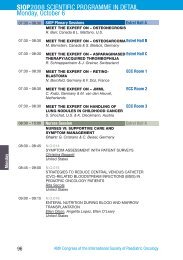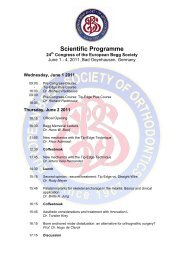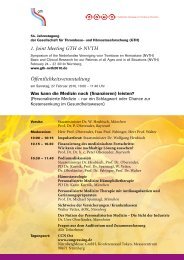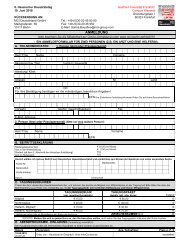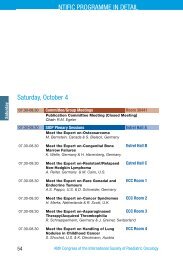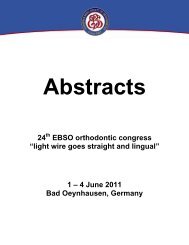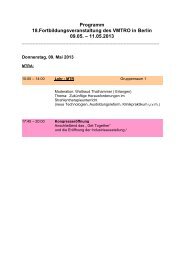96. Jahrestagung der Deutschen Gesellschaft für Pathologie e. V ...
96. Jahrestagung der Deutschen Gesellschaft für Pathologie e. V ...
96. Jahrestagung der Deutschen Gesellschaft für Pathologie e. V ...
You also want an ePaper? Increase the reach of your titles
YUMPU automatically turns print PDFs into web optimized ePapers that Google loves.
Abstracts<br />
tioned above. For patients without lymph node or distant metastases<br />
(UICC stages I/II) and with complete tumor excision, HSP70 expression<br />
was the only independent prognostic factor for survival (p=0.001) and<br />
superior to UICC pT category. In left sided UICC stage I/II carcinomas,<br />
high HSP27 expression also had adverse prognostic impact and was an<br />
independent prognostic factor (p=0.016) besides HSP70 (p=0.002). There<br />
was no correlation between HSP27, HSP60 and HSP70 expression<br />
among each other and with UICC pT category, presence of lymph node,<br />
distant metastases or tumor grading.<br />
Conclusions. High HSP70 and HSP27 expression is associated with worse<br />
clinical outcome. Determination of tumoral HSP70 and HSP27 may be<br />
used as additional biomarker for risk stratification in colon cancer patients<br />
especially in UICC stage I/II patients.<br />
FR-P-082<br />
p.G13D mutations in the KRAS oncogene are associated with<br />
sensitivity of colorectal carcinoma cells to anti-EGFR antibody<br />
treatment<br />
I . Messner1 , S .E . Baldus1 , H .E . Gabbert1 , K .-L . Schäfer1 1Heinrich-Heine-University Düsseldorf, Inst . of Pathology, Düsseldorf<br />
Aims. Targeted therapies with the anti-EGFR antibodies panitumumab<br />
(Pmab) or cetuximab (Cmab) have shown significant benefit for patients<br />
suffering from metastatic colorectal carcinoma (mCRC). According to<br />
the approval by the American Food and Drug Administration and the<br />
European Medicines Agency, application of these antibodies is restricted<br />
to tumors without mutation in the KRAS oncogene. However, a recent<br />
metaanalysis of 579 CRC patients treated with cmab indicated that<br />
patients with p.G13D-mutated tumors (exchange of glycine at codon 13<br />
to aspartic acid) showed a longer overall survival compared to patients<br />
with tumors mutated in KRAS codon 12. In or<strong>der</strong> to study the functional<br />
impact of the subtype of KRAS mutation on the efficiency of EGFR-targeted<br />
therapies in CRC, we have determined the KRAS mutation status<br />
of colorectal carcinoma cell lines and correlated these data to the in vitro<br />
sensitivity of these cells to cmab and Pmab.<br />
Methods. Using a set of 15 colorectal cancer cell lines, the KRAS mutation<br />
status was evaluated by Sanger sequencing. Mutations in the potential<br />
predictive biomarkers BRAF and PIK3CA as well as protein expression<br />
of EGFR and PTEN were also determined. In vitro sensitivity of tumor<br />
cells to anti-EGFR antibodies was measured by standard MTT assays.<br />
Results. Seven of 15 cell lines showed a KRAS mutation including four<br />
cell lines exhibiting the p.G13D mutation. If these cell lines were treated<br />
using panitumumab or cetuximab, a significant growth inhibition was<br />
observed, while cell lines showing a KRAS mutation at codon 12 or 61<br />
were not sensitive to anti-EGFR treatment. Only three of eight cell lines<br />
showing KRAS wild type status were sensitive to Pmab and cmab. Noteworthy,<br />
all of the five resistant KRAS wild type cell lines were either<br />
characterized by BRAF mutation or by absence of EGFR or PTEN protein<br />
expression, respectively. No correlation between PIK3CA mutation<br />
status and sensitivity to anti-EGFR treatment could be demonstrated.<br />
Conclusions. Our in vitro data from colon carcinoma cell lines indicate<br />
that tumor cells showing the KRAS p.G13D mutation may respond to<br />
EGFR-targeted therapy. Therefore, subtype analysis of KRAS mutation<br />
should be included in prospective clinical trials analyzing the responsiveness<br />
of CRC to cmab or Pmab. In KRAS wild type tumor cells, additional<br />
aberrations like BRAF mutation and loss of EGFR or PTEN expression<br />
may lead to resistance to EGFR-targeted therapy and should be<br />
consi<strong>der</strong>ed as additional negative predictive biomarkers.<br />
110 | Der Pathologe · Supplement 1 · 2012<br />
FR-P-083<br />
UBCH10 overexpression in human colorectal cancers<br />
S . Piscuoglio1 , P . Pallante2 , L . Tornillo3 , A . Fusco2 , L . Terracciano 3<br />
1 2 University of Basel, Department of Biomedicine, basel, Switzerland, University<br />
of Naples, Istituto di Endocrinologia ed Oncologia Sperimentale “G .<br />
Salvatore” (IEOS-CNR) c/o Dipartimento di Biologia e Patologia Cellulare e<br />
Molecolare, naples, Italy, 3University of Basel, Institute of Pathology, Basel,<br />
Switzerland<br />
Aims. Colorectal cancer is the result of the accumulation of different<br />
genetic modifications including critical genes involved in the control of<br />
cell proliferation. In a large number of carcinomas with worst prognosis,<br />
lesions are not diagnosed until the disease is at an advanced stage. To<br />
diagnose cancer at an early stage and to establish more effective therapies<br />
featuring of key molecules in carcinogenesis is a critical step. UBCH10<br />
(also known as E2C or UBE2C) is a cell cycle-related protein involved in<br />
mitosis completion. UbcH10 participates in proper metaphase to anaphase<br />
transition, and abrogation of UbcH10 results in the premature<br />
separation of sister chromatids. Thus, UbcH10 is essential for cell cycle<br />
progression, and his expression is cell-cycle dependent and related to<br />
proliferation. The aim of this study is to investigate the association of<br />
UbcH10 gene expression with clinicopathological features and tumor<br />
progression of colorectal cancer.<br />
Methods. We investigated the expression of the UBCH10 genes in a tissue<br />
microarray platform consisting of normal and neoplastic colorectal<br />
cancers (CRC) tissues by immunohistochemistry. UBCH10 was detectable<br />
in 889 patients. Immunoreactivity was scored semi-quantitatively<br />
by evaluating the number of positive tumor cells over the total number<br />
of tumor cells. Scores were assigned using 5% intervals and ranged from<br />
0% to 100%. Median protein expression levels were used as cut-off scores<br />
to define protein marker positivity and the findings were associated with<br />
clinical-pathological parameters.<br />
Results. Our results demonstrated that UBCH10 is overexpressed in<br />
CRCs tissues compared to normal colon (p


